Learning Direct and indirect speech can help us to share in two simple ways what someone says. In direct speech, we use the exact words of the speaker with quotation marks, like She said, “I like apples. In indirect speech, we change the words to explain the same idea without quotation marks, like She said that she liked apples. These are very important because they help us share messages clearly. in this article, I have covered, 500 Examples of Direct and indirect Speech in English that we use in our daily life English Speaking. All are given below, let’s learn…
Table of Contents
ToggleExamples of Direct and indirect Speech in English
These Examples are very helpful for all students and English learners in understanding how to report speech correctly in conversations and writing.
Direct and Indirect Speech Examples
| Direct Speech | Indirect Speech |
|---|---|
| “I am going home,” he said. | He said he was going home. |
| “She is reading a book,” said Tom. | Tom said she was reading a book. |
| “We will attend the meeting,” said John. | John said they would attend the meeting. |
| “I can’t do it,” she said. | She said she couldn’t do it. |
| “They are happy now,” said Mark. | Mark said they were happy then. |
| “I have seen this movie,” he said. | He said he had seen that movie. |
| “You should try harder,” she said. | She said I should try harder. |
| “It is raining heavily,” he said. | He said it was raining heavily. |
| “We are playing football,” they said. | They said they were playing football. |
| “I forgot my keys,” she said. | She said she had forgotten her keys. |
| “I will call you tomorrow,” he said. | He said he would call me the next day. |
| “She has been to Paris,” said Sam. | Sam said she had been to Paris. |
| “We are leaving now,” they said. | They said they were leaving then. |
| “You can do better,” he said. | He said I could do better. |
| “I am studying for exams,” she said. | She said she was studying for exams. |
| “I bought this car yesterday,” he said. | He said he had bought that car the day before. |
| “You must complete it today,” she said. | She said I must complete it that day. |
| “I don’t like chocolate,” he said. | He said he didn’t like chocolate. |
| “We saw her at the park,” they said. | They said they had seen her at the park. |
| “I am very tired,” she said. | She said she was very tired. |
Examples of Direct and Indirect Speech
| Direct Speech | Indirect Speech |
|---|---|
| “He plays football,” she said. | She said he played football. |
| “We need more time,” they said. | They said they needed more time. |
| “I lost my wallet,” he said. | He said he had lost his wallet. |
| “You look beautiful,” she said. | She said I looked beautiful. |
| “I haven’t eaten lunch,” he said. | He said he hadn’t eaten lunch. |
| “She loves dancing,” said Lisa. | Lisa said she loved dancing. |
| “I will help you,” he said. | He said he would help me. |
| “We are going to the market,” they said. | They said they were going to the market. |
| “I saw him yesterday,” she said. | She said she had seen him the day before. |
| “I don’t know the answer,” he said. | He said he didn’t know the answer. |
| “We were watching TV,” they said. | They said they had been watching TV. |
| “I am learning French,” she said. | She said she was learning French. |
| “He can solve this problem,” she said. | She said he could solve that problem. |
| “You must be on time,” he said. | He said I must be on time. |
| “We have completed the project,” they said. | They said they had completed the project. |
| “I need a break,” she said. | She said she needed a break. |
| “I don’t trust him,” he said. | He said he didn’t trust him. |
| “She was crying,” said Tom. | Tom said she had been crying. |
| “We shall overcome,” they said. | They said they would overcome. |
| “He enjoys swimming,” she said. | She said he enjoyed swimming. |
100 Direct and Indirect Speech Examples
| Direct Speech | Indirect Speech |
|---|---|
| “I can finish this work,” he said. | He said he could finish that work. |
| “We visited the museum,” they said. | They said they had visited the museum. |
| “I need some rest,” she said. | She said she needed some rest. |
| “He looks tired,” she said. | She said he looked tired. |
| “I didn’t understand the lesson,” he said. | He said he hadn’t understood the lesson. |
| “We will meet you later,” they said. | They said they would meet me later. |
| “She speaks French fluently,” he said. | He said she spoke French fluently. |
| “I have no money left,” she said. | She said she had no money left. |
| “You should be more careful,” he said. | He said I should be more careful. |
| “They are planning a trip,” she said. | She said they were planning a trip. |
| “I haven’t slept well,” he said. | He said he hadn’t slept well. |
| “We had a great time,” they said. | They said they had a great time. |
| “He is a good teacher,” she said. | She said he was a good teacher. |
| “I forgot my umbrella,” he said. | He said he had forgotten his umbrella. |
| “We can solve this problem,” they said. | They said they could solve that problem. |
| “I feel better now,” she said. | She said she felt better then. |
| “He has been very kind,” they said. | They said he had been very kind. |
| “I don’t like spicy food,” she said. | She said she didn’t like spicy food. |
| “We arrived late last night,” he said. | He said they had arrived late the night before. |
| “She loves watching movies,” he said. | He said she loved watching movies. |
Basic Examples of Direct and Indirect Speech in English
| Direct Speech | Indirect Speech |
|---|---|
| “I enjoy painting,” she said. | She said she enjoyed painting. |
| “We will leave early tomorrow,” he said. | He said they would leave early the next day. |
| “I haven’t seen him today,” she said. | She said she hadn’t seen him that day. |
| “He works very hard,” they said. | They said he worked very hard. |
| “I can’t do this alone,” she said. | She said she couldn’t do that alone. |
| “We are preparing for the exam,” they said. | They said they were preparing for the exam. |
| “I saw her last week,” he said. | He said he had seen her the previous week. |
| “She has completed the project,” he said. | He said she had completed the project. |
| “I don’t like loud music,” she said. | She said she didn’t like loud music. |
| “We were walking in the park,” they said. | They said they had been walking in the park. |
| “He often visits his grandmother,” she said. | She said he often visited his grandmother. |
| “I will fix this problem,” he said. | He said he would fix that problem. |
| “You should listen to her advice,” she said. | She said I should listen to her advice. |
| “We are watching a new show,” they said. | They said they were watching a new show. |
| “I can come with you,” he said. | He said he could come with me. |
| “She bought a new phone,” he said. | He said she had bought a new phone. |
| “I need help with this,” she said. | She said she needed help with that. |
| “They are staying in a hotel,” he said. | He said they were staying in a hotel. |
| “I haven’t finished my homework,” she said. | She said she hadn’t finished her homework. |
| “We had a great experience,” they said. | They said they had a great experience. |
Advanced Examples of Direct and Indirect Speech
| Direct Speech | Indirect Speech |
|---|---|
| “I love reading books,” she said. | She said she loved reading books. |
| “We are waiting for the bus,” they said. | They said they were waiting for the bus. |
| “He hasn’t arrived yet,” she said. | She said he hadn’t arrived yet. |
| “I will bring the documents,” he said. | He said he would bring the documents. |
| “She likes Italian food,” he said. | He said she liked Italian food. |
| “We are planning a surprise party,” they said. | They said they were planning a surprise party. |
| “I lost my phone yesterday,” she said. | She said she had lost her phone the day before. |
| “He is very talented,” she said. | She said he was very talented. |
| “I don’t know the reason,” he said. | He said he didn’t know the reason. |
| “We have seen this movie before,” they said. | They said they had seen that movie before. |
| “She will call you later,” he said. | He said she would call me later. |
| “I am working on a project,” she said. | She said she was working on a project. |
| “We are visiting our grandparents,” they said. | They said they were visiting their grandparents. |
| “I forgot to bring my book,” he said. | He said he had forgotten to bring his book. |
| “She is waiting for her friend,” he said. | He said she was waiting for her friend. |
| “I can’t solve this puzzle,” she said. | She said she couldn’t solve that puzzle. |
| “We arrived late to the meeting,” they said. | They said they had arrived late to the meeting. |
| “I am feeling very sleepy,” he said. | He said he was feeling very sleepy. |
| “She hasn’t eaten anything today,” he said. | He said she hadn’t eaten anything that day. |
| “We need more time to decide,” they said. | They said they needed more time to decide. |
Direct and Indirect Speech in English
| Direct Speech | Indirect Speech |
|---|---|
| “I forgot my wallet,” she said. | She said she had forgotten her wallet. |
| “We will finish this soon,” he said. | He said they would finish that soon. |
| “I don’t trust him,” she said. | She said she didn’t trust him. |
| “They are helping their friends,” he said. | He said they were helping their friends. |
| “I saw a beautiful bird,” she said. | She said she had seen a beautiful bird. |
| “He enjoys reading novels,” they said. | They said he enjoyed reading novels. |
| “I can handle this myself,” she said. | She said she could handle that herself. |
| “We met her at the park,” he said. | He said they had met her at the park. |
| “She will join us tomorrow,” they said. | They said she would join them the next day. |
| “I don’t like hot weather,” he said. | He said he didn’t like hot weather. |
| “We were talking about you,” she said. | She said they had been talking about me. |
| “I need some extra time,” he said. | He said he needed some extra time. |
| “She has been waiting long,” they said. | They said she had been waiting long. |
| “We are going to the beach,” he said. | He said they were going to the beach. |
| “I can’t attend the meeting,” she said. | She said she couldn’t attend the meeting. |
| “They watched a great movie,” he said. | He said they had watched a great movie. |
| “I always wake up early,” she said. | She said she always woke up early. |
| “We have completed the assignment,” they said. | They said they had completed the assignment. |
| “I feel very happy today,” she said. | She said she felt very happy that day. |
| “He is working on the problem,” they said. | They said he was working on the problem. |
Examples of Direct and Indirect Speech in English
| Direct Speech | Indirect Speech |
|---|---|
| “I am learning new things,” he said. | He said he was learning new things. |
| “She plays the piano well,” they said. | They said she played the piano well. |
| “I lost my keys yesterday,” she said. | She said she had lost her keys the day before. |
| “We are watching a documentary,” he said. | He said they were watching a documentary. |
| “She can drive a car,” they said. | They said she could drive a car. |
| “I don’t like noisy places,” she said. | She said she didn’t like noisy places. |
| “We saw a rainbow,” he said. | He said they had seen a rainbow. |
| “She has been very helpful,” they said. | They said she had been very helpful. |
| “I will clean the room,” she said. | She said she would clean the room. |
| “He is speaking to the manager,” they said. | They said he was speaking to the manager. |
| “We need more volunteers,” she said. | She said they needed more volunteers. |
| “I don’t understand this question,” he said. | He said he didn’t understand that question. |
| “She loves spending time outdoors,” they said. | They said she loved spending time outdoors. |
| “We were waiting for the bus,” he said. | He said they had been waiting for the bus. |
| “I have to finish my work,” she said. | She said she had to finish her work. |
| “They are having a good time,” he said. | He said they were having a good time. |
| “I feel very tired now,” she said. | She said she felt very tired then. |
| “He often forgets important things,” they said. | They said he often forgot important things. |
| “We saw a great performance,” she said. | She said they had seen a great performance. |
| “I will call you later,” he said. | He said he would call me later. |
English Sentences of Direct vs Indirect
| Direct Speech | Indirect Speech |
|---|---|
| “I can solve this puzzle,” she said. | She said she could solve that puzzle. |
| “We met them last evening,” he said. | He said they had met them the previous evening. |
| “She doesn’t eat fast food,” they said. | They said she didn’t eat fast food. |
| “I will help you tomorrow,” she said. | She said she would help me the next day. |
| “We are traveling to another city,” he said. | He said they were traveling to another city. |
| “She has been working hard,” they said. | They said she had been working hard. |
| “I feel confident about my answer,” she said. | She said she felt confident about her answer. |
| “We were watching the sunset,” he said. | He said they had been watching the sunset. |
| “He needs to take a break,” she said. | She said he needed to take a break. |
| “I always enjoy sunny weather,” they said. | They said they always enjoyed sunny weather. |
| “We are thinking of visiting you,” he said. | He said they were thinking of visiting me. |
| “I haven’t read this book,” she said. | She said she hadn’t read that book. |
| “They saw a rare animal,” he said. | He said they had seen a rare animal. |
| “I will bring my laptop,” she said. | She said she would bring her laptop. |
| “We are learning new techniques,” they said. | They said they were learning new techniques. |
| “I feel much better today,” he said. | He said he felt much better that day. |
| “She doesn’t trust strangers,” they said. | They said she didn’t trust strangers. |
| “We need to leave now,” she said. | She said they needed to leave then. |
| “I haven’t spoken to her,” he said. | He said he hadn’t spoken to her. |
| “They are planning to buy a car,” she said. | She said they were planning to buy a car. |
Direct to Indirect Sentences in English
| Direct Speech | Indirect Speech |
|---|---|
| “I will study harder,” he said. | He said he would study harder. |
| “She likes reading novels,” they said. | They said she liked reading novels. |
| “We met her last weekend,” he said. | He said they had met her last weekend. |
| “I can finish it today,” she said. | She said she could finish it that day. |
| “They are playing in the park,” he said. | He said they were playing in the park. |
| “I haven’t been there before,” she said. | She said she hadn’t been there before. |
| “We need more time to prepare,” they said. | They said they needed more time to prepare. |
| “I enjoy walking in the mornings,” she said. | She said she enjoyed walking in the mornings. |
| “He will call us tomorrow,” they said. | They said he would call them the next day. |
| “I feel proud of my work,” she said. | She said she felt proud of her work. |
| “We are having lunch together,” he said. | He said they were having lunch together. |
| “I always forget my umbrella,” she said. | She said she always forgot her umbrella. |
| “They saw a movie last night,” he said. | He said they had seen a movie last night. |
| “I can help with your task,” she said. | She said she could help with my task. |
| “We are thinking about the plan,” they said. | They said they were thinking about the plan. |
| “I will join you later,” he said. | He said he would join me later. |
| “She hasn’t spoken to him yet,” they said. | They said she hadn’t spoken to him yet. |
| “I need to take a rest,” she said. | She said she needed to take a rest. |
| “We were waiting for her reply,” he said. | He said they had been waiting for her reply. |
| “I feel excited about this event,” she said. | She said she felt excited about that event. |
Direct with indirect Sentences in English
| Direct Speech | Indirect Speech |
|---|---|
| “I can solve this problem,” he said. | He said he could solve that problem. |
| “She has completed her project,” they said. | They said she had completed her project. |
| “We need to hurry up now,” she said. | She said they needed to hurry up then. |
| “I will help you tomorrow,” he said. | He said he would help me the next day. |
| “They are working on the design,” she said. | She said they were working on the design. |
| “I don’t like crowded places,” they said. | They said they didn’t like crowded places. |
| “We saw him at the station,” he said. | He said they had seen him at the station. |
| “She is learning a new language,” they said. | They said she was learning a new language. |
| “I feel confident about my skills,” she said. | She said she felt confident about her skills. |
| “We are planning to visit you,” he said. | He said they were planning to visit me. |
| “I haven’t finished my work yet,” she said. | She said she hadn’t finished her work yet. |
| “They saw an amazing performance,” he said. | He said they had seen an amazing performance. |
| “I will bring my documents tomorrow,” she said. | She said she would bring her documents the next day. |
| “We are learning new strategies now,” they said. | They said they were learning new strategies then. |
| “I feel happier than yesterday,” she said. | She said she felt happier than the day before. |
| “He often forgets important dates,” they said. | They said he often forgot important dates. |
| “We need to discuss this plan,” she said. | She said they needed to discuss that plan. |
| “I haven’t heard from him recently,” he said. | He said he hadn’t heard from him recently. |
| “They are thinking about the decision,” she said. | She said they were thinking about the decision. |
| “I feel relaxed after the meeting,” he said. | He said he felt relaxed after the meeting. |

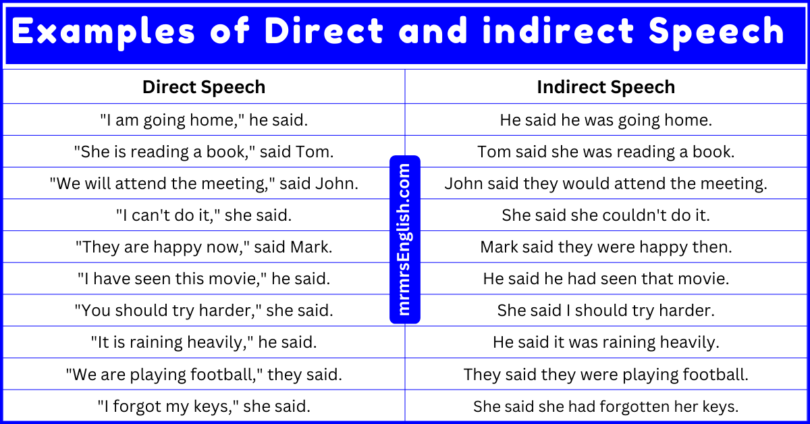










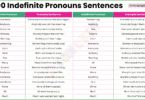
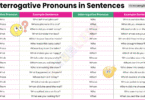
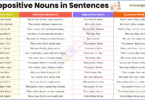
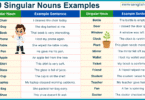
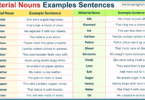
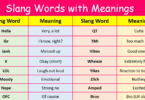
Leave a Comment